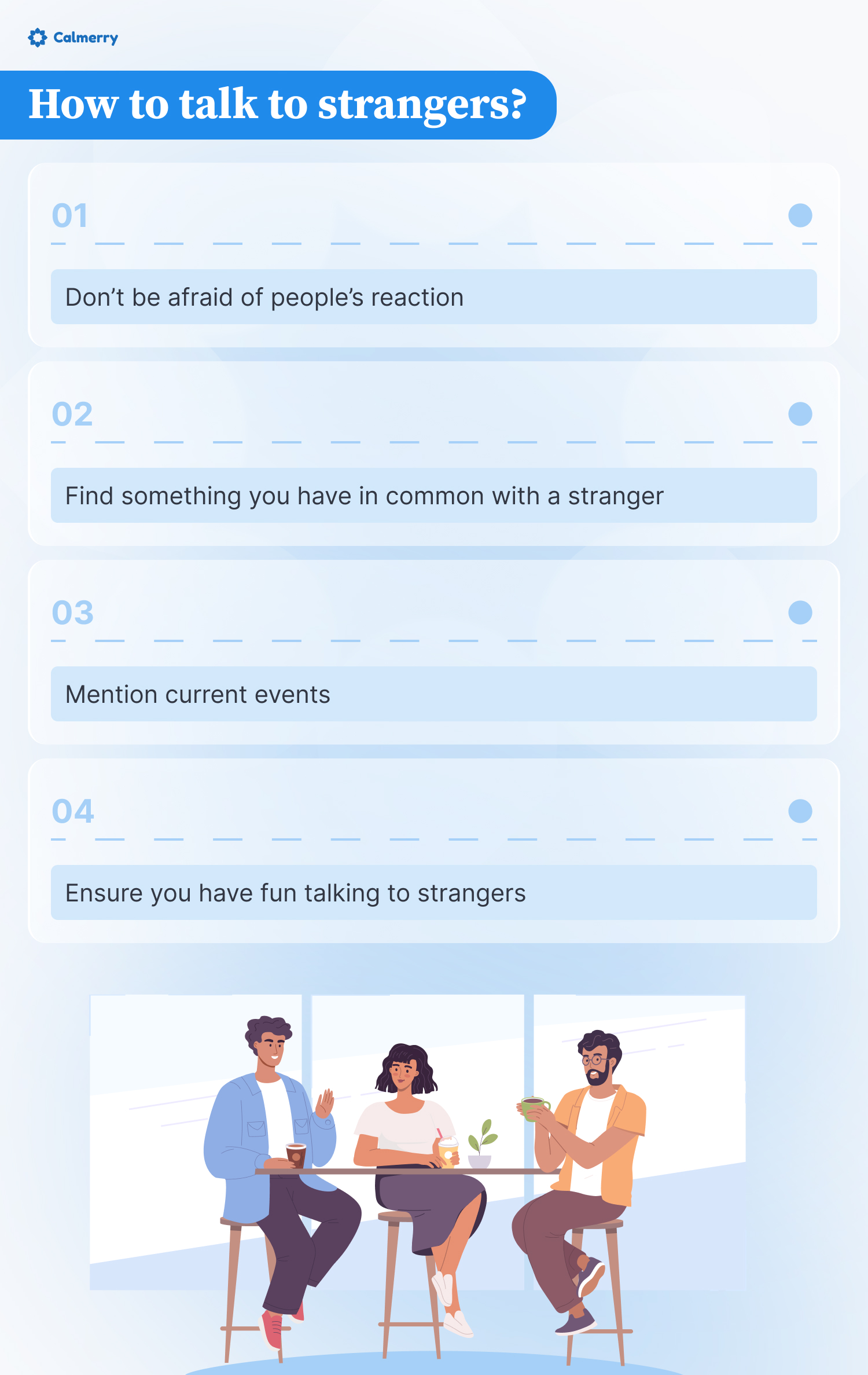How to Talk to Random People?

In this article
Most meaningful relationships start with a light conversation. It begins with two strangers striking a simple talk that turns into a strong bond.
For some, interacting with strangers is their forte. These types of people like to interact with new people outside their circle. It brings a sense of fulfillment in their lives.
On the other hand, there is a category of those who find it difficult to talk to strangers. It becomes difficult for such people to form meaningful bonds with other people.
Research shows that despite individuals’ initial fear of starting a conversation with strangers, usually this practice turns out to be better than expected. [1] Sandstrom, G. M., & Boothby, E. J. (2020). Why do people avoid talking to strangers? A mini meta-analysis of predicted fears and actual experiences talking to a stranger. Self and Identity, 20(1), 47–71. https://doi.org/10.1080/15298868.2020.1816568
Interacting with strangers brings some fun. Below are some tips on how to talk to random people without fear.
How to talk to strangers?
Talking to strangers can sometimes be challenging. Starting a conversation with someone you don’t know might feel a little scary at first. [2] Sandstrom, G. M., Boothby, E. J., & Cooney, G. (2022). Talking to strangers: A week-long intervention reduces psychological barriers to social connection. Journal of Experimental Social Psychology, 102, 104356. https://doi.org/10.1016/j.jesp.2022.104356 However, with a few simple tips, you can learn how to do it easily.
Remember, many people feel the same way, and they will likely appreciate your effort to connect.
Anyway, don’t worry – we’re here to help you! Soon, after your first conversation with a stranger, you’ll feel more confident talking to new people and making new friends.
Don’t be afraid of people’s reaction
You don’t have to be afraid of people’s reactions when talking to strangers. Remember, everyone likes a friendly conversation. Even if someone seems a little shy or quiet, they will usually appreciate your effort to talk to them.
If a stranger you started a conversation with seems kind of indifferent and not interested, you can always end a conversation and talk to another person.
Don’t be afraid of rejection; think positively – this person saved your time and now you can look for the right one, who will probably become your friend later.
So, be yourself, stay positive, and don’t worry too much about how others will react.
Find something you have in common with a stranger
Sharing common interests helps you connect better and makes the conversation more enjoyable for both of you. Start by asking simple questions about their hobbies, favorite foods, or places they like to visit.
As you talk, listen carefully and look for things that you both enjoy or have experienced.
Finding something you have in common with a stranger can make the conversation more fun and interesting.
Mention current events
Talking about current events is a good way to start a conversation with a stranger. Many people follow the news and have opinions about what’s happening in the world. For example, you can talk about lifestyle, politics, economy, climate change, or sports.
Also, you can ask if they’ve heard about a recent event or news story and what they think about it. This can lead to an interesting discussion and help you learn more about each other’s views and interests.
Just remember to keep the conversation friendly and avoid very sensitive topics.
Ensure you have fun talking to strangers
Do not feel the obsessive need to hold back to avoid rejection. Be your true self and have fun when talking to strangers!
Enjoying the conversation helps you feel more relaxed and makes the other person feel good too. When you’re having fun, you’re more likely to smile, laugh, and be yourself, which makes the conversation more pleasant for everyone.
Meeting new people is a great way to learn new things and make new friends, so try to enjoy the experience and have a good time.

How to make small talks with strangers?
Learning to talk with random individuals should not come with any pressures.
One way to avoid being too frightened when starting a conversation with a stranger is to have small talk.
Making small talk with a stranger can be easy and fun. It’s a great way to meet new people and learn new things.
Here are some tips on how to start and keep a small talk going with random people:
Start with simple questions
Begin the conversation with easy questions that anyone can answer. Ask about the weather, their plans for the day, or if they’ve been to the place you’re in before.
For example, you can say, “Nice weather today, isn’t it?” or “Have you tried the coffee here?”
These questions are simple and can help break the ice.
Show interest and listen
When the person answers, show interest in what they say. Nod your head, smile, and ask follow-up questions.
If they mention a hobby or a favorite place, ask more about it. For example, “You like hiking? Where’s your favorite trail?“
Listening carefully and responding makes the conversation flow naturally and shows that you care about what they have to say.
Questions to ask a stranger to start a conversation
When you feel you’re ready to start a conversation with a stranger, you may still be confused about how to do it.
The following simple questions will help you get off to a good start:
- Hi, how are you today?
- Have you been here before?
- What brings you here today?
- Where are you from?
- Do you have any favorite places in this city?
- What do you do for work or study?
- What’s your favorite thing to do on weekends?
- Have you watched any good movies or TV shows lately?
- Do you have any hobbies or interests?
- What kind of music do you like?
- Do you enjoy reading? What’s your favorite book?
- Do you like traveling? What’s the best place you’ve visited?
- Are you a sports fan? Which sport do you like the most?
- Do you have any pets?
- What’s your favorite type of food?
Challenging yourself to start a conversation with a stranger can help you overcome your fears and grow more confident. This push will likely bring you joy as you discover new connections and experiences.
Being resolute can also make the conversation more meaningful and productive.
If you try to be resolute, you’ll probably find that you enjoy the interaction more and feel more positive about the experience.
Final thoughts
As discussed above, talking to strangers brings much fun. However, if you still feel uncertain, online therapy can provide additional support and guidance.
At Calmerry, we have therapists from every discipline who are well-trained and ready to help. Our online program, supported by qualified therapists, will help you overcome the fear of talking to strangers.
Through personalized guidance and proven techniques, you’ll build confidence and communication skills. With our support, you’ll soon find social interactions more enjoyable and less intimidating.
Don’t hesitate to seek help from professionals to overcome your fears and enjoy more fulfilling interactions.
Sandstrom, G. M., & Boothby, E. J. (2020). Why do people avoid talking to strangers? A mini meta-analysis of predicted fears and actual experiences talking to a stranger. Self and Identity, 20(1), 47–71. https://doi.org/10.1080/15298868.2020.1816568
Sandstrom, G. M., Boothby, E. J., & Cooney, G. (2022). Talking to strangers: A week-long intervention reduces psychological barriers to social connection. Journal of Experimental Social Psychology, 102, 104356. https://doi.org/10.1016/j.jesp.2022.104356
online therapy
live video session


